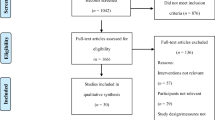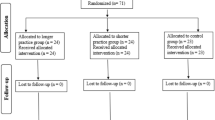Abstract
To examine the effectiveness of a brief mindfulness-based interventions (MBIs) and educational interventions (EI) on self-efficacy and burden among family caregivers (FCs) of patients with cancer in Jordan. A quasi-experimental design was conducted. Two interventions were performed: the brief MBIs and the EIs were applied. A sampling of 138 FCs completed the study interventions. The FCs in the mindfulness group demonstrated a significant improvement in measures of self-efficacy and reduction in burden scores. Furthermore, in the EI group, only self-efficacy was significantly higher in the post-test. Burden reduction was significantly higher in the EI group than the mindfulness group. Appropriate supportive interventions should be directed to improve self-efficacy and reduce burden to assist FCs to carry out their crucial role in providing care for their patients.

Similar content being viewed by others
References
Reinhard SC, Feinberg LF, Choula R, Houser A (2015) Valuing the invaluable: 2015 update, Insight on the Issues, vol. 104
Yabroff KR, Kim Y (2009) Time costs associated with informal caregiving for cancer survivors. Cancer 115(S18):4362–4373
Kim H, Lee S, Cheon J, Hong S, Chang M (2018) A comparative study to identify factors of caregiver burden between baby boomers and post baby boomers: a secondary analysis of a US online caregiver survey. BMC Public Health 18(1):579
Kershaw T, Ellis KR, Yoon H, Schafenacker A, Katapodi M, Northouse L (2015) The interdependence of advanced cancer patients’ and their family caregivers’ mental health, physical health, and self-efficacy over time. Ann Behav Med 49(6):901–911
Bandura A (1995) Self-efficacy in changing societies. Cambridge university press
Zavagli V, Miglietta E, Varani S, Pannuti R, Brighetti G, Pannuti F (2016) Associations between caregiving worries and psychophysical well-being. An investigation on home-cared cancer patients family caregivers. Support Care Cancer 24(2):857–863
Mosby I (2006) Mosby's medical dictionary. Mosby
Birnie K, Garland SN, Carlson LE (2010) Psychological benefits for cancer patients and their partners participating in mindfulness-based stress reduction (MBSR). Psycho-Oncology 19(9):1004–1009
E. National Academies of Sciences and Medicine (2016) Families caring for an aging America. National Academies Press
Al-Daken L, Ahmad M (2018) Predictors of burden and quality of sleep among family caregivers of patients with cancer. Support Care Cancer 26(11):3867–3973
Northouse M, Katapodi C, Song L, Zhang L, Mood DW (2010) Interventions with family caregivers of cancer patients: meta-analysis of randomized trials. CA Cancer J Clin 60(5):317–339
Kabat-Zinn J (2005) Coming to our senses: healing ourselves and the world through mindfulness, Hachette
Luker K, Cooke M, Dunn L, Lloyd-Williams M, Pilling M, Todd C (2015) Development and evaluation of an intervention to support family caregivers of people with cancer to provide home-based care at the end of life: a feasibility study. Eur J Oncol Nurs 19(2):154–161
Fujinami R, Otis-Green S, Klein L, Sidhu R, Ferrell B (2012) Quality of life of family caregivers: challenges faced in care of the lung cancer patient. Clin J Oncol Nurs 16(6):E210
Belgacem B, Auclair C, Fedor MC, Brugnon D, Blanquet M, Tournilhac O, Gerbaud L (2013) A caregiver educational program improves quality of life and burden for cancer patients and their caregivers: a randomised clinical trial. Eur J Oncol Nurs 17(6):870–876
Shum NF, Lui YL, Law WL, Fong YTD (2014) A nurse-led psycho-education programme for Chinese carers of patients with colorectal cancer: Nga Fan Shum and colleagues report on a randomised controlled trial of the effectiveness of telephone support in Hong Kong. Cancer Nurs Pract 13(5):31–39
Bahrami M, Farzi S (2014) The effect of a supportive educational program based on COPE model on caring burden and quality of life in family caregivers of women with breast cancer. Iran J Nurs Midwifery Res 19(2):119
Martín JM, Olano-Lizarraga M, Saracíbar-Razquin M (2016) The experience of family caregivers caring for a terminal patient at home: a research review. Int J Nurs Stud 64:1–12
Abdel-Razeq H, Attiga F, Mansour A (2015) Cancer care in Jordan. Hematology/Oncology and Stem Cell Therapy 8(2):64–70
Grant M et al (2013) Family caregiver burden, skills preparedness, and quality of life in non-small-cell lung cancer. In: Oncology nursing forum, vol 40. NIH Public Access, p 337
S. C. Reinhard, B. Given, N. H. Petlick, and A. Bemis, Supporting family caregivers in providing care, 2008
Al-Daken L, Ahmad M (2018) The implementation of mindfulness-based interventions and educational interventions to support family caregivers of patients with cancer: a systematic review. Perspect Psychiatr Care 54(3):441–452
Porter LS, Keefe FJ, McBride CM, Pollak K, Fish L, Garst J (2002) Perceptions of patients' self-efficacy for managing pain and lung cancer symptoms: correspondence between patients and family caregivers. Pain 98(1):169–178
Novak M, Guest C (1989) Application of a multidimensional caregiver burden inventory. The Gerontologist 29(6):798–803
Chou K-R, Jiann-Chyun L, Chu H (2002) The reliability and validity of the Chinese version of the caregiver burden inventory. Nurs Res 51(5):324–331
Kabat-Zinn J (2018) Meditation is not what you think: mindfulness and why it is so important, Hachette
Rayan A, Ahmad M (2016) Effectiveness of mindfulness-based interventions on quality of life and positive reappraisal coping among parents of children with autism spectrum disorder. Res Dev Disabil 55:185–196
St Charles L (2010) Mindfulness, self-compassion, self-efficacy, and locus of control: examining relationships between four distinct but theoretically related concepts
Liu H-Y, Huang L-H (2016) The relationship between family functioning and caregiving appraisal of dementia family caregivers: caregiving self-efficacy as a mediator. Aging Ment Health:1–10
van den Hurk D, Schellekens M, Molema J, Prins J, Speckens A, van der Drift M (2013) Feasibility and acceptability of mindfulness-based stress reduction (MBSR) in patients with lung cancer and their partners: a mixed-method pilot study. Pscyho-oncology 22:103
van den Hurk DG, Schellekens MP, Molema J, Speckens AE, van der Drift MA (2015) Mindfulness-based stress reduction for lung cancer patients and their partners: results of a mixed methods pilot study. Palliat Med:0269216315572720
Whitebird RR, Kreitzer M, Crain AL, Lewis BA, Hanson LR, Enstad CJ (2012) Mindfulness-based stress reduction for family caregivers: a randomized controlled trial. 53(4):676–686
Northouse L, Kershaw T, Mood D, Schafenacker A (2005) Effects of a family intervention on the quality of life of women with recurrent breast cancer and their family caregivers. Psycho-Oncology 14(6):478–491
Porter LS, Keefe FJ, Garst J, Baucom DH, McBride CM, McKee DC, Sutton L, Carson K, Knowles V, Rumble M, Scipio C (2011) Caregiver-assisted coping skills training for lung cancer: results of a randomized clinical trial. J Pain Symptom Manag 41(1):1–13
Bevans M, Wehrlen L, Castro K, Prince P, Shelburne N, Soeken K, Zabora J, Wallen GR (2014) A problem-solving education intervention in caregivers and patients during allogeneic hematopoietic stem cell transplantation. J Health Psychol 19(5):602–617
Al-Daken LI, Ahmad MM, Assessing levels of self-efficacy among family caregivers of patients with cancer
Hendrix CC, Bailey DE Jr, Steinhauser KE, Olsen MK, Stechuchak KM, Lowman SG, Schwartz AJ, Riedel RF, Keefe FJ, Porter LS, Tulsky JA (2016) Effects of enhanced caregiver training program on cancer caregiver’s self-efficacy, preparedness, and psychological well-being. Support Care Cancer 24(1):327–336
Creedle C, Leak A, Deal AM, Walton AM, Talbert G, Riff B, Hornback A (2012) The impact of education on caregiver burden on two inpatient oncology units. J Cancer Educ 27(2):250–256
Funding
The authors received funding from the University of Jordan.
Author information
Authors and Affiliations
Corresponding author
Ethics declarations
Ethical Issues
Approvals from the Institutional Review Board (IRB) were obtained from the ethics committee in the selected settings. Data collection commenced after a written informed consent form was signed by the FCs who agreed to participate in both interventions were asked to complete the questionnaires at two different time frames: for baseline data (before interventions), and at the end of the brief MBI and EI after 5 weeks for both groups.
Conflict of Interest
The authors declare that they have no conflict of interest.
Additional information
Publisher’s Note
Springer Nature remains neutral with regard to jurisdictional claims in published maps and institutional affiliations.
Key Points
• The brief MBIs hold optimistic results as an effective intervention to enhance self-efficacy and reduce burden among FCs of patients with cancer.
• We found that providing educational programs and offering medical information to FCs significantly have improved the levels of self-efficacy of FCs.
• FCs who are mindfully aware of their thoughts, feelings, and physical sensations can become more conscious about their abilities to perform tasks appropriately.
Rights and permissions
About this article
Cite this article
Ahmad, M.M., Al-Daken, L.I. Clinical Trial on Mindfulness with Family Caregivers for Patients with Cancer. J Canc Educ 37, 304–310 (2022). https://doi.org/10.1007/s13187-020-01812-3
Published:
Issue Date:
DOI: https://doi.org/10.1007/s13187-020-01812-3




